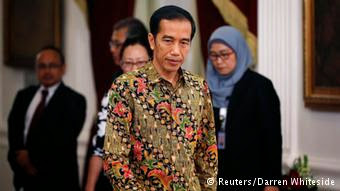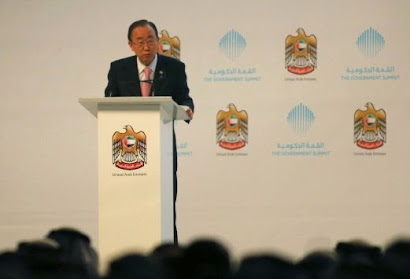Jakarta Globe, Tobias Basuki, Aug 22, 2014
 |
| (JG Graphics/Josep Tri Ronggo Laksono) |
Basuki
Tjahaja Purnama, better known as Ahok, will be the first ethnic Chinese to
govern Indonesia’s capital, Jakarta.
Ahok is not
the first ethnic Chinese to gain political prominence in Indonesia, where the
Muslim-Javanese group dominates political positions. But he may be the first to
break unspoken barriers of expected behaviours and norms of an ethnic Chinese
participating in politics.
The
outspoken and sometimes brash deputy governor will take over Jakarta’s helm
when the incumbent Joko Widodo, the country’s president-elect better known as
Jokowi, takes office in October.
Ahok is a
distinctive figure in Indonesian politics. This is not simply due to his
“double minority” status as Chinese Indonesian and Christian but also a result
of how he regards or disregards those labels.
In
Indonesia, ethnic Chinese were subjected to discriminatory laws during
Suharto’s dictatorship. When Suharto fell from power in 1998, they were the
targets of anti-Chinese riots.
Ahok never
shied away from his ethnicity. In his campaigns and when dealing with political
situations, he often mentions his Chinese heritage. He has told
self-deprecating jokes by referring to himself as a pork-eating infidel. When
he ran for governor of Bangka Belitung, an archipelagic province off Sumatra,
his campaign material had a picture of him in full Mandarin outfit.
But Ahok
does not use his ethnicity to gain popular support. While some Chinese
Indonesians form part of his support, his base of voters has never been built
on ethnicity or identity politics.
This is
different from most Chinese Indonesians who climbed the “political track.”
Elected leaders of Chinese ethnicity would typically be in charge in areas with
a large Chinese population such as Singkawang, West Kalimantan.
There are
exceptions. The recently elected mayor of the Central Java city of Malang,
Mochamad Anton, is Chinese Indonesian. But Anton is a Muslim. His ethnicity is
diluted by his religious identity.
Anton holds
the prestigious title of haji. He is also part of the local Nahdlatul Ulama
chapter, Indonesia’s biggest Islamic mass organisation. His appointment has not
created much buzz due to these factors.
Some
Chinese Indonesians gain political prominence by being appointed as ministers
or to other bureaucratic posts. In such cases, the president or regional
leaders appoint them mostly for their skills, usually in the fields of
economics, finance and trade.
This is
where Ahok is different from other prominent Chinese Indonesians. Ahok is not a
technocrat. He has held political positions in areas where Chinese Indonesians
are minorities.
Ahok started
his political career in a region where his ethnicity is not political capital
to run for local government. He first served as a councilor in Belitung Timur,
in the Bangka-Belitung Islands made famous by “Laskar Pelangi” (“Rainbow
Warriors”) author Andrea Hirata. He became district head of Belitung Timur in
2005.
After two
years as district head, Ahok ran for Bangka-Belitung governor and lost in a
close race. He continued his political progress by becoming a parliamentary
member representing the region.
He rose to
his current position by adamantly pursuing his political ambitions. When not
endorsed by his party (Golkar) to run as governor of Jakarta in 2012, he ran as
an independent before the Great Indonesia Movement (Gerindra) Party a recruited
him. He then ran as deputy governor with Jokowi.
But does
Ahok’s rise show a shift in Indonesia’s sociopolitical atmosphere in regard to
identity politics? Do Indonesian people no longer care about their leaders’
ethnicity and religion?
Jakarta’s
2012 gubernatorial election and the nation’s July 2014 presidential election
tell us a few things.
In both
elections, Jokowi and Ahok (2012) and Jokowi (2014) had huge public support and
enthusiasm behind them. And in both contests opponents used smear campaigns on religious
and ethnic issues.
The smear
campaign against Jokowi, who was accused of being a secret Christian of Chinese
descent, almost worked. He lost his double-digit lead in opinion surveys just
weeks before the election. Jokowi won, but with a close margin of 53 percent,
against 46 percent for his rival.
Ethnicity
and religion do have traction in elections, but they are not make-or-break
factors. Religious identity in general is a more significant factor than ethnic
identity.
Based on
the results of a March 2014 CSIS national survey, it appears that Indonesia is
not ready for people from minority groups to lead the nation. When asked if
they objected to having an ethnic Chinese as president or vice-president, close
to two-thirds of respondents said they did. The percentage rose to 71.7 percent
when asked if they objected to having a non-Muslim president or vice-president.
But when we
replace the conceptual question with real-case scenarios the results differ.
The same survey presented several presidential pair scenarios. Interestingly,
pairing Jokowi and Ahok as presidential and vice-presidential candidates did
not diminish Jokowi’s electability.
It has
often been overlooked that Chinese Indonesians are very heterogeneous socially
and politically. Yet they are often treated and viewed as a monolithic group.
There is a
variety of views in regard to the political participation of ethnic Chinese.
Some are still cautious, traumatized by the 1998 riots. Others are quite
enthusiastic about entering the political sphere.
The same
varied views apply to Ahok. Some are proud and supportive of his
accomplishments, while others are apprehensive. There are those who have
reservations due to a fear that his brash demeanor may create a backlash
against the Chinese, while a smaller minority are not supportive of him as he
does not give special privileges.
Regardless
of the changes in political dynamics nationally and among Chinese Indonesians,
Ahok is pushing the nation forward. He is breaking barriers that had defined
Indonesia’s socio-political environment. He has changed the game by having
voters appraise politicians on their merits instead of ethnic and religious
markers.
Yet Ahok is
also an Indonesian politician who is unashamedly Chinese and Christian. He
carries his background with pride, not for his identity but for Indonesia’s
multicultural potential.
Tobias
Basuki is a researcher at the Department of Politics and International
Relations at the Center for Strategic and International Studies in Jakarta.
The Conversation
 |
Jakarta Deputy Governor Basuki Tjahaja Purnama.
(JG Photo/ Afriadi Hikmal) |
Related Articles:
"Recalibration of Free Choice"– Mar 3, 2012 (Kryon Channelling by Lee Carroll) - (Subjects: (Old) Souls, Midpoint on 21-12-2012, Shift of Human Consciousness, Black & White vs. Color, 1 - Spirituality (Religions) shifting, Loose a Pope “soon”, 2 - Humans will change react to drama, 3 - Civilizations/Population on Earth, 4 - Alternate energy sources (Geothermal, Tidal (Paddle wheels), Wind), 5 – Financials Institutes/concepts will change (Integrity – Ethical) , 6 - News/Media/TV to change, 7 – Big Pharmaceutical company will collapse “soon”, (Keep people sick), (Integrity – Ethical) 8 – Wars will be over on Earth, Global Unity, … etc.) - (Text version)
“…5 - Integrity That May Surprise…
The Unthinkable… Politics, A Review
Humans will begin to search for integrity and fairness and it's going to happen in the places you never expect. I said this last week, so this is a review. There'll come a time when you will demand this of your politics - fairness and integrity. So when the candidates start calling each other names, you will turn your back on them and they won't get any votes. They're going to get the point real fast, don't you think? How about that?
Let me give you another potential. This country that I sit in right now [USA] will set the mold for that particular attribute. I have no clock. Watch for the youngsters to set this in motion, and they will, for they are the voters of tomorrow and they do not want the energy of today. To some of them, it's so abominable they won't even register to vote in this energy. You're going to see this soon. That was number five.. ..."























